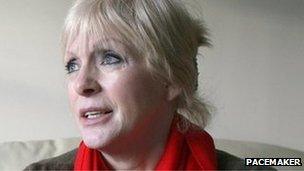US court rules Dolours Price interview must be given to PSNI
- Published
A US appeal court has ruled that interviews given by former IRA bomber Dolours Price should be handed over to the Police Service of Northern Ireland.
The interviews are part of the Boston College Belfast Project which began in 2001 and lasted five years.
Former IRA member Anthony McIntyre and journalist Ed Moloney argued that the release could harm the peace process.
The material - wanted by police as part of an ongoing Disappeared inquiry - is expected to be handed over next month.
The Police Service of Northern Ireland (PSNI) is seeking the transcripts of an interview given by Price, who took part in a London bombing in 1973, to Mr McIntyre and Boston College.
Transcripts
She later gave an interview to a newspaper journalist, in which she admitted that she had taken part in the Belfast Project.
In that interview she allegedly claimed to have been the person who drove one of the Disappeared, mother-of-10 Jean McConville, to her death in 1972.

Dolours Price told a newspaper journalist she had taken part in the Belfast Project
The Disappeared were people abducted, murdered and secretly buried by the IRA.
The PSNI said it had re-opened the inquiry into Mrs McConville's murder was seeking the transcripts on that basis.
Initial court decisions in the United States accepted the PSNI's interest as legitimate, and the tapes of the Price interview and seven others deemed pertinent to an investigation into the Disappeared were placed in the hands of the US federal court.
Boston College also appealed against the decision to hand over the tapes, but separately.
It said it had no grounds to protect the anonymity of Price, given that she had effectively "outed" herself in a newspaper interview.
The college has also launched legal action to try to stop the handover of seven other IRA interviews, querying their value to any investigation.
Testimonies
Mr Moloney and former IRA member-turned-historian Mr McIntyre had argued against any disclosure of the material.
They stressed that those interviewed from both the Catholic and Protestant sides of the conflict were promised confidentiality until their deaths.
<link> <caption>In her ruling</caption> <altText>In her ruling</altText> <url href="http://www.ca1.uscourts.gov/cgi-bin/getopn.pl?OPINION=11-2511P.01A" platform="highweb"/> </link> , chief Appeal Court Judge Sandra Lynch said the researchers could not state a claim that they have rights under a legal-assistance treaty between the United States and the United Kingdom.
She also acknowledged that while the researchers claimed an academic research privilege under their constitutional rights to freedom of speech, "the choice to investigate criminal activity belongs to the government and is not subject to veto by academic researchers."
DUP MP Gregory Campbell said: "This is a step closer to establishing if there is information in the tapes that might be of assistance to the authorities in Northern Ireland.
"This could lead to the investigation of many senior personnel within the IRA and other groups about matters they were involved in, and if that is the case it would be welcome."
Price participated in the car bombing of the Old Bailey courthouse in London on 8 March 1973. The explosion injured more than 200 people.
The Belfast Project involved academics, historians and journalists conducting interviews with former republicans and loyalists about their activities during the Troubles.
The researchers have argued that releasing the documents could risk the lives of people who gave testimonies.
- Published4 April 2012
- Published4 April 2012
- Published24 January 2012
- Published22 January 2012